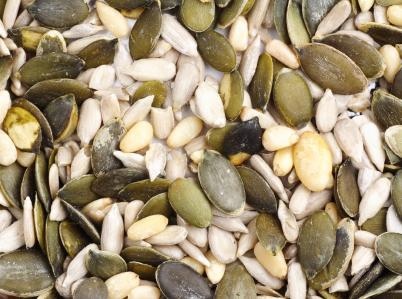
We are a snacking society. This is obvious with the widespread availability of these seductively tasty treats. But with most of these snacks loaded with sugar, high fructose corn syrup, MSG, and hydrogenated oils, we are contributing to our death every bite we take. And some of us aren’t even hungry; we are just in the habit of putting something in our mouths or simply eating out of boredom.
To help steer your snacking in a more healthy direction, you can add seeds to your munching menu. Most seeds are high in Omega 3 and Omega 6 essential fatty acids (EFAs). These EFAs “balance and regulate energy production, blood circulation, nerve function, inflammation, hormone regulation, recovery from exercise, immune function, cell growth, . . . and can elevate mood,” and “improve brain function and development.” The benefits of eating seeds are a great contrast to any typical processed snack food you could eat.
As a snack, you can eat seeds by the handful and you can eat them in more substantive ways by adding them in smoothies and protein drinks, putting them on salads and in salad dressings, and mixing them into garden burgers and other raw recipes.
I offer you a list of edible seeds to reach for next time you want to snack:
Chia seeds – These are good in Omega 3 and Omega 6 fatty acids and are high in calcium, copper, manganese, phosphorus, and zinc. They are a great source of protein and fiber, and have anti-inflammatory and laxative properties.
Flax seeds (AKA linseed) – Like chia seeds, flax seeds are high in Omega 3 and Omega 6 EFAs and have anti-inflammatory and laxative properties. They are rich in several B-vitamins, copper, iron, lecithin, magnesium, manganese, phosphorus, potassium, selenium, zinc, and all 8 essential amino acids. They are a good source of fiber and protein and contain lignan, a phytoestrogen that has been shown to prevent cancer, heart disease and osteoporosis. These seeds should be ground before using.
Hemp seeds -These nut-like flavored seeds are high in Omega 3 and Omega 6 EFAs and are a great source of fiber and protein, containing all the essential amino acids. These are great in raw and cooked foods.
Pumpkin seeds – Great in and out of the shell, these seeds are rich in B-vitamins, copper, iron, lignan, magnesium, manganese, phosphorus, potassium, selenium, zinc, Omega 6, and vitamin E. They are a great source of protein and fiber.
Sesame seeds – Another good choice to add to raw and cooked foods, they are rich in B-vitamins, calcium, copper, iron, magnesium, manganese, potassium, zinc, Omega 6, linoleic acid, protein and fiber.
Sunflower seeds – These seeds have the same properties as pumpkin seeds , but they are also rich in calcium and linoleic acid. These, too, are rich in protein and fiber.
If but just in a minimal way, I hope you at least add seeds to your snack menu. You now know the great benefits of seeds being a part of your diet. Won’t you add them to add health in a significant way to your life?


I enjoyed this post and all your health post. Thanks for taking out the time to bring this vital information.
I’m glad you enjoyed this post, Sidne. Thanks for the compliment and reading, and you’re most welcome for the information.